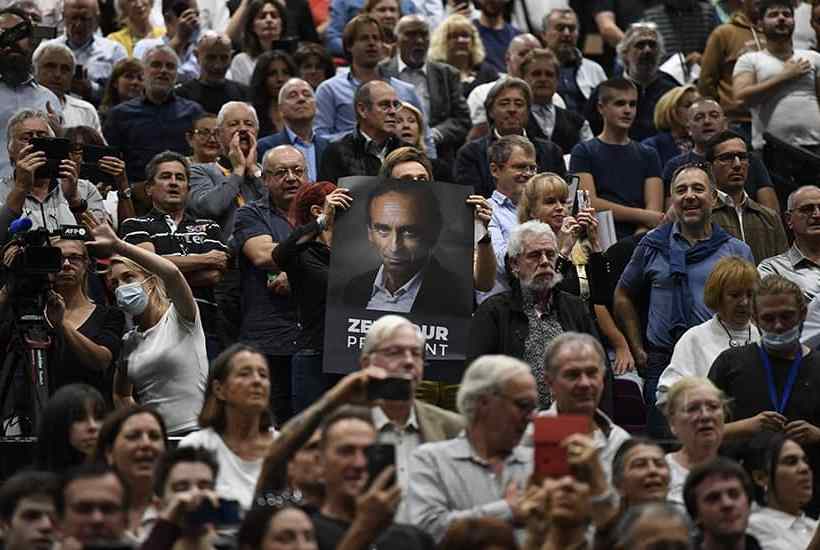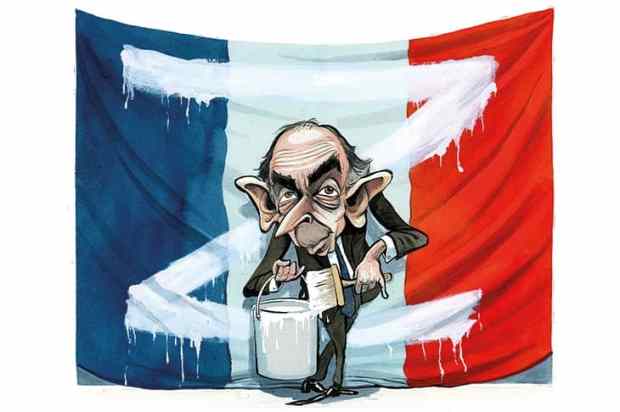Béziers is the ancient winemaking capital of the Occitanie region in the deep south of France and a stronghold of the French right. Its popular mayor, Robert Ménard, a former journalist, was elected as an independent, but with a strong endorsement from Marine Le Pen. Her political movement, the Rassemblement National, formerly the National Front, with historical roots in anti-Semitism, has been powerful here for decades.
So is it paradoxical, bizarre, or perhaps evidence of a more profound shift of social and political tectonic plates, that last Saturday night thousands of Biterrois turned out at the Zinga Zanga theatre to cheer Éric Zemmour, a Parisian Jewish intellectual, author and television and radio journalist?
I got there early and started talking to dozens of Zemmour’s fans as they lined up to enter the hall. Many had come hundreds of miles. There were scores of students. All were disillusioned with Le Pen. Many admitted they’d previously voted for Nicolas Sarkozy. This was not a traditional National Front crowd in their blue smocks, driving those battered Renault vans that look like garden sheds on wheels. The car park was filled with Audis, BMWs, top-line Peugeots and a Jaguar or two. The crowd was well-spoken and smartly dressed.
Zemmour, a Pied-Noir whose Berber parents fled Algeria during the war of independence, is labelled a racist, Islamophobe and right-wing extremist in much of the French media. Critics compare him with Trump and note his convictions for inciting racial hatred. This can sound shocking abroad — but in France, less so. Incitement to racial hatred can be a subjective crime, with prosecutions brought by politicised magistrates. If anything, his convictions seem to add to his insurgent appeal.
Zemmour is ready to confront taboo subjects. In his speech on Saturday, he insisted that immigrants assimilate or get out. He attacked the obsessive focus on racism and colonialism in the media, government, schools, universities and cultural institutions, saying it has undermined families, the relations between men and women, and religion. He called the state broadcasters ‘organs of propaganda’. He called for Christian, Jewish and Muslim families to unite at the damage being done to schools by imported anti-meritocratic American ideologies such as critical race theory.
He arrived at the stage an hour late, but still to thunderous applause and chants of ‘Zemmour Président’. The night before he had been in Nîmes, where he’d had an equally supercharged reaction. Versailles was next, to be followed by Rouen, Caen, Rennes and Nantes. He spoke for 25 minutes and took questions for another 25.
Zemmour has been physically attacked twice in Paris, yet in Béziers he vaulted a crowd control barrier and ran towards hundreds of his admirers to shake hands. When President Macron tried this in June, he was slapped in the face.
Afterwards Zemmour spent an hour signing copies of his book. I grabbed a moment with him and asked how he viewed the threats of Macron’s government to cut off electricity supplies to Britain in retaliation for the squabble over post-Brexit fishing rights.
Ever the intellectual, he noted that Anglo-French relations have been worse — a reference to the Napoleonic wars, doubtless — and then put the blame on Europe and particularly the negotiations led by Michel Barnier, who has recently declared that he’s a candidate for the presidency. ‘The French fishermen thought they could continue as always, the English that they would get everything back. This was the result of holes in Barnier’s dossier, the consequence of poor negotiation.’
It’s dangerous to extrapolate too much from one night in Béziers. Zemmour nevertheless seems to be offering something new and attractive to voters who have rapidly been losing faith in politics. French presidential elections have a reputation for producing unpredicted results. Macron is the most recent example. Zemmour may well be the next.
Got something to add? Join the discussion and comment below.
Get 10 issues for just $10
Subscribe to The Spectator Australia today for the next 10 magazine issues, plus full online access, for just $10.
You might disagree with half of it, but you’ll enjoy reading all of it. Try your first month for free, then just $2 a week for the remainder of your first year.














Comments
Don't miss out
Join the conversation with other Spectator Australia readers. Subscribe to leave a comment.
SUBSCRIBEAlready a subscriber? Log in